Are you planning a fishing trip soon but feel anxious about sea sickness? Don’t worry, you’re not alone.
For many people, the thought of being out on the open water can trigger seasickness symptoms such as nausea and vomiting. However, there are various preventative measures and remedies you can take to combat seasickness and enjoy your fishing trip.
Seasickness, also known as motion sickness, occurs when your vestibular system in the inner ear (which controls balance) senses a mismatch of signals from your eyes and body. This often happens when you’re on a boat that’s rocking back and forth or swaying side-to-side.
The most common seasickness symptoms include dizziness, cold sweats, queasy feeling in the stomach, headache, and fatigue. But fear not!
There are several ways to prevent sea sickness while fishing. In this article, we will explore 7 tips that will help you prepare for your next fishing trip with ease.
Whether it’s your first time on a boat or you’ve experienced seasickness before, these tips will ensure that you prevent seasickness so that you can enjoy every minute of your adventure. Some preventative measures include avoiding greasy foods before embarking on longer trips and drinking plenty of water to keep yourself hydrated.
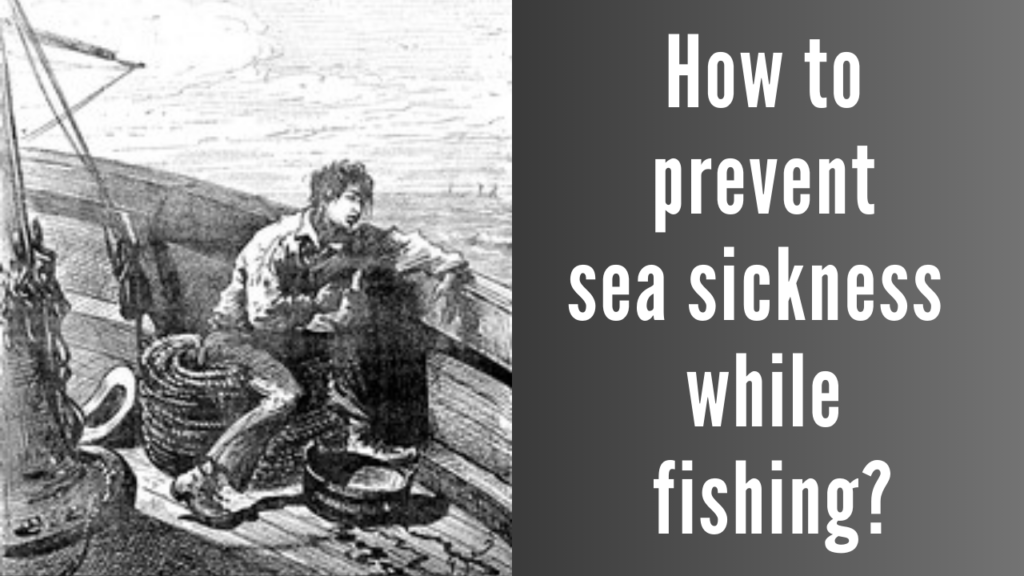
Table of Contents
- What is sea sickness?
- 7 tips on How to Prevent Sea Sickness While Fishing
- Best motion sickness medicine for deep sea fishing
- Is there a way to stop sea sickness?
- What foods prevent sea sickness?
- What drinks prevent sea sickness?
- Does chewing gum help motion sickness?
- Can lemon cure sea sickness?
- What is the best oil for sea sickness?
- Why is ginger good for sea sickness?
- Does Coke help sea sickness?
- Final Thoughts
What is sea sickness?
Sea sickness, also known as motion sickness or seasickness, is a common condition that affects many people when they are on a boat or ship. It occurs when there is a conflict between the body’s senses of balance and motion.
For example, when the eyes see the boat moving, but the inner ear does not sense any movement, it can trigger seasickness. The queasy feeling can sometimes lead to vomiting and other uncomfortable symptoms.
Seasickness symptoms can vary in severity from person to person. Some experience mild nausea while others may feel like they’re going to die!
The symptoms usually start with a feeling of unease in the stomach and eventually lead to dizziness, cold sweats, headaches, and fatigue. It’s important not to ignore these symptoms because they could get worse over time.
Thankfully there are many ways to prevent sea sickness so that you don’t have to suffer through an entire deep sea fishing trip feeling miserable. You can take prescription medication like Dramamine or use herbal remedies such as Chinese medicine ginger root capsules which are said to help prevent seasickness naturally.
There are also other drugs available for purchase without prescription in pharmacies such as Marezine and Bonine that do not cause drowsiness. In addition to taking medication or herbal remedies before going on an offshore fishing or deep sea fishing trip there are a few tips you can follow like staying hydrated throughout your trip by drinking plenty of water instead of alcohol which will only dehydrate you further making you feel worse!
7 tips on How to Prevent Sea Sickness While Fishing
One of the worst things that can happen when you’re out on the water fishing is getting hit with sea sickness. There’s nothing worse than feeling queasy, dizzy, and nauseous while trying to enjoy a day on the boat. Luckily, there are ways to prevent sea sickness from ruining your fishing trip.
Here are 7 tips on How to Prevent Sea Sickness While Fishing:
1) Prepare with Motion Sickness Medicine or Herbal Remedies
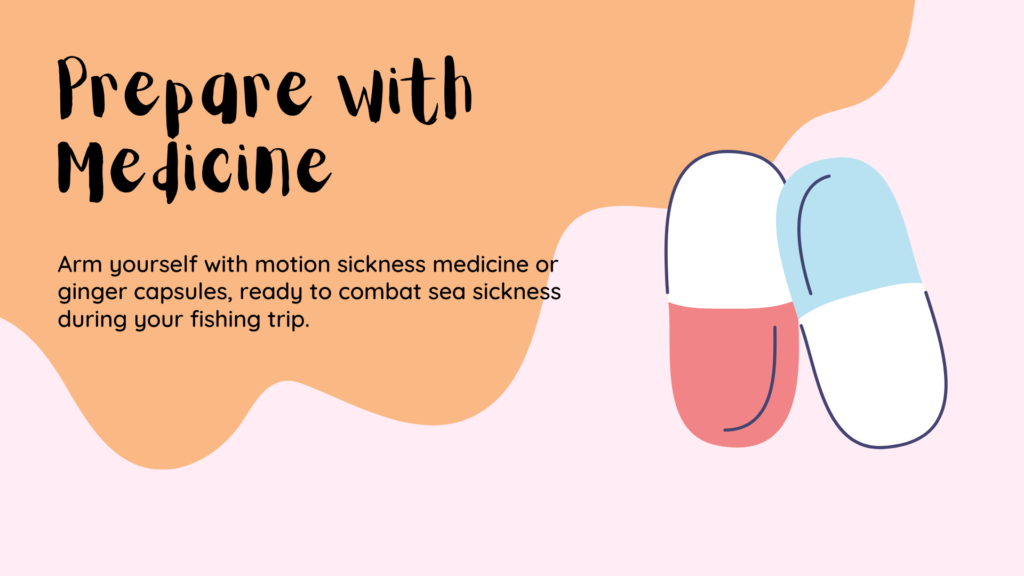
Motion sickness can be a real problem for people who love to fish. Luckily, there are several ways to prevent motion sickness while deep sea fishing. The first tip is to prepare with motion sickness medicine or herbal remedies.
There are several different types of motion sickness medicines available on the market today. Dramamine is likely one of the most well-known and effective options out there, but it’s important to note that this medication can cause drowsiness as a side effect.
So, if you’re planning on taking this medication before your fishing trip, make sure you don’t need to drive the boat or operate heavy machinery! Another popular option for preventing seasickness is using herbal remedies like ginger or peppermint.
Ginger is a natural anti-inflammatory that can help combat nausea and reduce gastric juice secretion in your digestive system. You can take ginger supplements or buy ginger candy at any health food store.
It’s important to note that some people may have adverse reactions to certain medicines or herbal remedies, so talk with your doctor before trying anything new. Pregnant women should also avoid certain medications and check with their doctor before taking any kind of anti-nausea medication.
In addition to taking medicine or using herbal remedies, it’s also important to eat a light meal before heading out on your fishing trip. Choose foods rich in lean protein and avoid anything too greasy or heavy which could make you feel worse once you’re out on the high seas.
2) Stay Hydrated and Eat Light

When it comes to preventing sea sickness while fishing, what you put into your body matters just as much as what you do on the boat.
Eating greasy foods or drinking alcohol before the trip will only increase your chances of getting sick. Instead, opt for bland foods and plenty of water to stay hydrated.
Eating light is also crucial when fishing on high seas. You don’t want a full stomach when the waves are rocking the boat.
Choose small meals that won’t weigh you down or make you feel nauseous. Snacking on fruits like apples or bananas can provide energy without making you feel too full.
Drinking water regularly throughout the trip is important to avoid dehydration, which can make seasickness symptoms worse. Avoid sugary drinks that can upset your stomach and stick with plain water instead.
If you want something with a bit more flavor, ginger ale can help settle your stomach without causing any additional motion sickness. It’s also a good idea to avoid caffeine and other diuretics as they can dehydrate you quickly.
Instead, opt for herbal teas like peppermint or chamomile, which are known for their calming effects on the stomach. By staying hydrated and eating light, you’ll be doing yourself a favor in preventing sea sickness while enjoying your next fishing trip in fresh air!
3) Avoid Alcohol and Other Medications
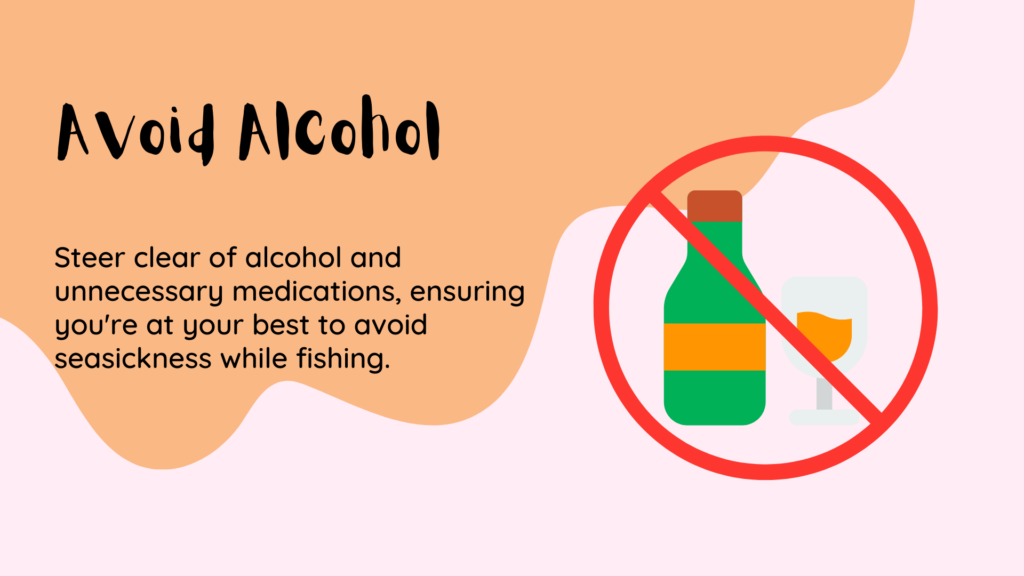
When preparing for a deep sea fishing trip, it’s important to pay attention to what you’re putting into your body.
Drinking alcohol, taking medication or other substances can trigger seasickness and make you feel queasy. That’s why it’s essential to avoid them at all costs if you want to prevent sea sickness.
Alcohol is a big no-no when it comes to offshore fishing. Not only does it dehydrate your body, but it also affects your balance and coordination.
This makes it harder for you to keep your sea legs steady on the fishing boat, especially if the water is choppy. If you must drink alcohol, make sure that it’s in moderation and on land, not during the trip.
Another type of substance that can cause motion sickness is medication. Certain medications such as antibiotics or painkillers can interfere with the digestive system and trigger symptoms of nausea.
Before going on a deep sea fishing expedition, consult with your doctor about any medication that may affect your ability to combat nausea or prevent sea sickness. If avoiding motion sickness is crucial for you but don’t want to take any medicine, there are still a few options available for preventing seasickness naturally.
Chinese medicine suggests fresh flowers such as lavender or peppermint can help alleviate symptoms of motion sickness along with herbal remedies like ginger ale or chewing ginger root before setting sail helps too! Make sure not to have an empty stomach before consuming anything though because this might worsen the queasy feeling associated with a lack of food in the belly during rough conditions at sea!
4) Get Plenty of Fresh Air and Take Deep Breaths
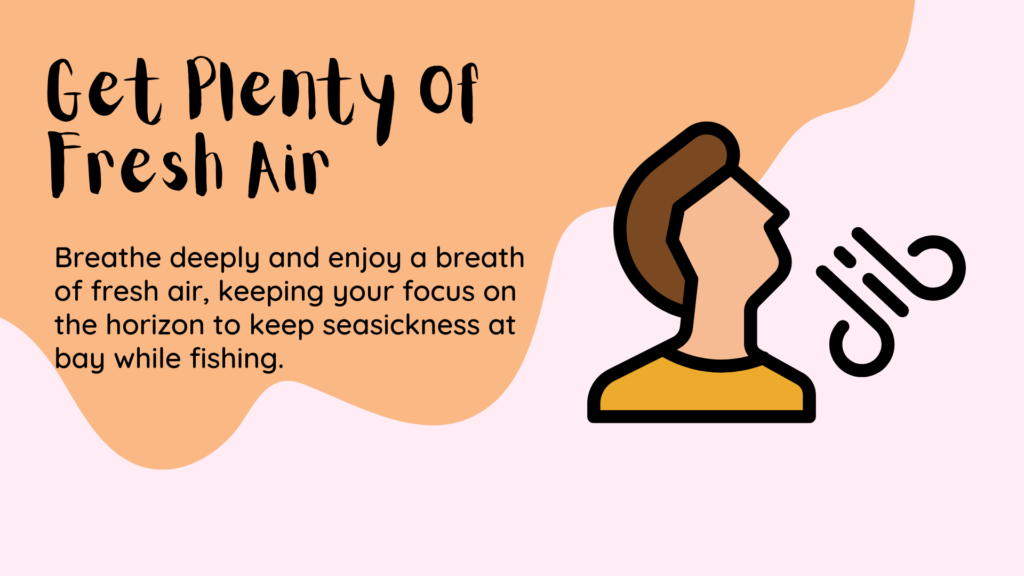
Another effective way to prevent sea sickness while fishing is to get plenty of fresh air and take deep breaths. Spending time below deck or in areas with poor ventilation can increase the likelihood of feeling seasick.
Therefore, it’s best to stay on deck and enjoy the sunny weather and salty sea air. Taking deep breaths can help regulate your breathing and calm your nerves, which in turn can reduce the risk of feeling queasy.
In addition to getting fresh air, there are a few tips you can follow to maximize its benefits when trying to prevent sea sickness. For example, you may want to position yourself near the front of the boat where there is less motion, making it easier for you to breathe in fresh air without being affected by sudden movements that could exacerbate any inner ear issues.
It’s also a good idea to avoid standing near areas where exhaust fumes or other unpleasant odors may be present, as these could make you feel even more nauseous. If taking deep breaths alone does not seem to be enough, consider using some natural remedies like ginger root or peppermint oil that can help treat seasickness symptoms while providing an extra boost for your respiratory system.
These items are available at most drug stores and health food stores as well as online retailers such as Amazon. Alternatively, try using traditional Chinese medicine techniques such as acupressure or acupuncture points which have been shown effective in treating nausea-related conditions like seasickness.
Remember that prevention is always better than cure when it comes to sea sickness so make sure you are taking all necessary precautions such as avoiding drinking alcohol before or during your fishing trip and checking with a medical professional about best motion sickness medicine options for more severe cases. With these few tips in mind, you should be able to enjoy a fun-filled day on the high seas without feeling any cold sweats or mild hangover-like symptoms associated with sea sickness!
5) Get a Good Night’s Sleep Before the Fishing Trip
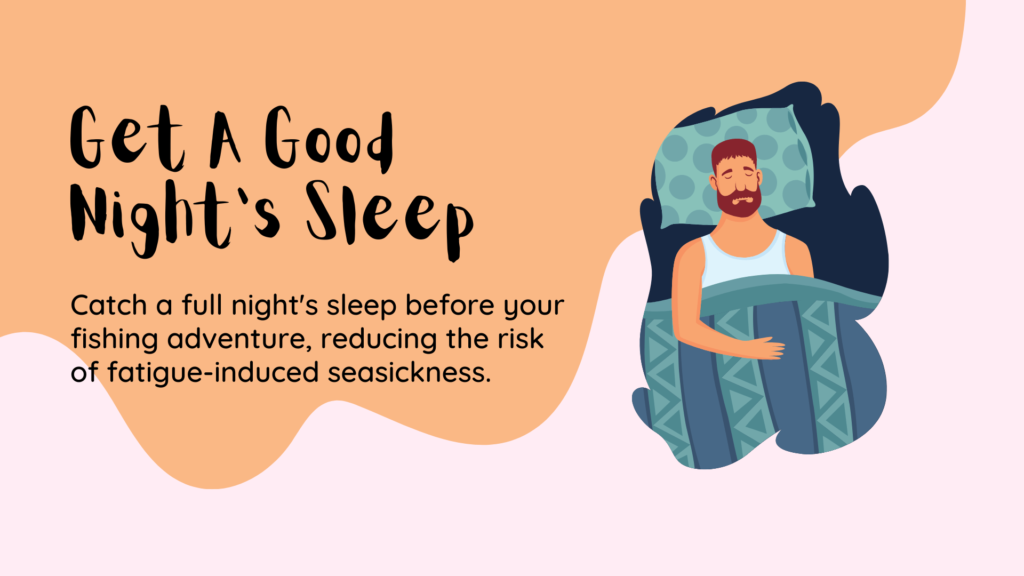
Getting a good night’s sleep before your big fishing trip is crucial to prevent sea sickness. Lack of sleep can cause fatigue, dizziness and nausea – all symptoms that can make sea sickness worse.
So, make sure you get at least 7-8 hours of sleep the night before your trip. If you’re having trouble sleeping, try drinking chamomile tea or taking melatonin supplements to help you relax.
It’s also a good idea to avoid caffeine and alcohol, which can disrupt your sleep cycle and dehydrate you. Instead, drink water or ginger ale to stay hydrated and feel refreshed in the morning.
Another tip for getting a restful night’s sleep is to turn off all electronic devices an hour before bedtime. The blue light emitted by screens can interfere with your body’s natural sleep patterns and make it harder for you to fall asleep.
6) Pay Attention to Boat Position and Weather Conditions

Another key aspect to preventing sea sickness while fishing is paying attention to the boat’s position and weather conditions. Being aware of these factors can help you adapt to the environment and reduce your chances of feeling seasick.
When it comes to boat position, it’s important to find a spot on the boat where you feel most comfortable. Generally, this will be in the center of the vessel where there is less movement.
You should also avoid staring at fixed objects like your fishing line or a book as this can make you feel more motion sick. Instead, look out at the horizon and focus on it as much as possible.
Weather conditions are also an important factor when it comes to preventing sea sickness while fishing. If there are high winds or rough seas, your chances of feeling seasick are increased.
It’s best to check the weather forecast before heading out on a boat trip and reschedule if necessary. If you do decide to go out despite rough conditions, make sure you’re prepared with all of the necessary gear and take extra precautions to prevent seasickness.
Many fishing charters will provide their customers with ginger candy or ginger root, which has been shown to help fight seasickness by reducing gastric juice secretion in your stomach. If you don’t have access to these herbal remedies, try soaking ginger in water overnight and drinking the liquid before heading out on your fishing trip.
In addition, taking a few deep breaths and focusing on something in front of you can help reorient your ear senses motion and prevent sea sickness from developing further. Remember that prevention is key when it comes to avoiding sea sickness while fishing!
7) Adapt to the Sea Environment Gradually

One of the best ways to prevent seasickness is to adapt to the sea environment gradually. This means that you should start by taking short trips on the water and gradually work your way up to longer trips. This will help your body adjust to the motion of the waves and reduce your chances of getting sick.
Another way to adapt gradually is to spend as much time as possible on fishing boats before your actual fishing trip. This will help you get used to the movement of the boat and build up your “sea legs” before you set out on a longer trip.
Spending time on boats can also help you familiarize yourself with common seasickness triggers, such as strong smells and loud noises, and develop strategies for avoiding them. When you’re out on a fishing trip, it’s important to continue adapting gradually by starting slow and building up activity levels slowly over time.
For example, if you feel queasy at first, start by sitting down for a while until your symptoms subside. Then try standing up or walking around for short periods of time until you feel comfortable enough to do more strenuous activities like casting or reeling in fish.
Bonus Tip: If you plan on taking medication for sea sickness, be sure to take it at least an hour before bedtime. This will give the medication time to kick in so that you wake up feeling refreshed and ready for your adventure!
Best motion sickness medicine for deep sea fishing
Most drug stores carry over-the-counter medication that helps treat seasickness. One of the most popular brands is Dramamine, which has been used for decades by those prone to motion sickness.
However, it’s important to remember that Dramamine can cause drowsiness, so it’s not recommended for those who plan on driving after their fishing trip. For those who prefer a more natural approach, herbal remedies such as ginger capsules or ginger root have been known to prevent motion sickness and are available at most health food stores.
Ginger ale can also help fight seasickness, but be sure to choose one made with real ginger for maximum effectiveness. If over-the-counter medicine or herbal remedies aren’t enough, prescription medication such as scopolamine patches may be an option.
These patches are placed behind the ear and work by calming the inner ear – the part of your body responsible for detecting motion – which can often trigger seasickness. Ultimately, choosing the best motion sickness medicine for your deep sea fishing trip depends on your personal preferences and needs.
Some may prefer a mild hangover feeling from Dramamine while others may opt for an herbal remedy like ginger root. Either way, taking steps to prevent sea sickness is crucial in ensuring an enjoyable fishing experience on open waters!
Read more: How Should You Pass A Fishing Boat?
Is there a way to stop sea sickness?
When it comes to sea sickness, prevention is usually the best approach. However, there are some methods that might help you stop sea sickness once it has begun. These methods may not work for everyone, but they are worth a try if you feel like you’re about to lose your lunch.
One way to stop sea sickness is by getting fresh air. If you’ve been inside the boat for a while and feel like you’re going to be sick, try stepping outside for a few minutes and take deep breaths of fresh air.
This can help clear your mind and calm down your stomach. Another method that might work is drinking ginger ale or chewing ginger candy.
Ginger has been used for centuries as a natural remedy for nausea and vomiting. You can also soak slices of ginger in hot water and drink the tea throughout the day.
If none of these methods work, over-the-counter medications such as Dramamine or Bonine can also be effective in stopping motion sickness. These medications can be found at most drug stores without a prescription.
Additionally, some Chinese medicine practitioners recommend acupressure wristbands, which apply pressure to certain points on your wrist said to alleviate nausea and vomiting. Remember that once sea sickness starts, it can be difficult to control or stop completely.
The best course of action is still prevention- avoiding motion sickness triggers such as alcohol or even mild hangovers before fishing trips, eating bland foods like crackers or lean protein before heading out on the boat , staying hydrated with plenty of water throughout the day and getting a good night’s sleep beforehand. Fishing charters may also offer tips on how to avoid feeling worse while out at sea based on their experience with previous customers who have experienced motion sickness during trips out on the water.
What foods prevent sea sickness?
When it comes to preventing sea sickness while fishing, what you eat can make a big difference. Bland foods like crackers, toast, and rice are often recommended to help settle your stomach and reduce seasickness symptoms.
These foods are easy on your digestive system and won’t make you feel sick like greasy or heavy meals might. It’s important to avoid anything too spicy or acidic, as these can exacerbate nausea and make your symptoms worse.
Another food that’s been shown to help prevent sea sickness is ginger. Ginger root contains natural compounds that can reduce motion sickness by easing the muscles in your stomach and reducing muscle fiber formation.
If eating raw ginger isn’t something you’re into, try taking ginger capsules before your fishing trip. You could also sip on ginger tea or take a few drops of ginger oil mixed with water.
In addition to eating the right foods, staying hydrated is crucial for preventing sea sickness while fishing. Drinking plenty of water throughout the day will help keep you hydrated and reduce the chances of getting seasick.
Avoid drinking alcohol or other beverages that dehydrate you, as this can make your symptoms worse. Overall, there are several foods that may help prevent sea sickness while fishing.
Bland foods like crackers and rice are easy on your stomach, while ginger has natural compounds that ease muscle tension in the stomach and reduce muscle fiber formation. Keeping yourself hydrated by drinking water throughout the day is also crucial for reducing motion sickness symptoms on a deep-sea fishing trip.
What drinks prevent sea sickness?
Now that we know what foods can help prevent sea sickness while fishing, let’s move on to drinks. Staying hydrated is important when you’re out on a fishing boat all day, but certain drinks can also help prevent motion sickness. Here are some of the best drinks to have on hand:
First up, ginger ale. We already talked about how ginger can help settle your stomach and prevent nausea and vomiting.
If you don’t like the taste of ginger root or don’t want to take ginger capsules, drinking ginger ale is a great alternative. Just make sure you look for an all-natural brand without added sugars or artificial flavors.
Another good option is water with lemon or lime juice. Staying hydrated is important when you’re trying to avoid sea sickness, but sometimes plain water just doesn’t cut it.
Adding some fresh citrus juice can give your body a little extra boost and make it easier to keep down fluids. Herbal teas are another great choice for preventing motion sickness while fishing.
Ginger tea is an obvious choice, but other scented oils like peppermint and chamomile can also be helpful. Plus, sipping a warm cup of tea can be comforting if you do start feeling queasy.
Of course, not everyone will like these particular drinks – the key is finding something that works for you personally. Experiment with different options before your next deep sea fishing trip so you know what will be most effective for preventing motion sickness in your unique situation!
Does chewing gum help motion sickness?
Another option to help prevent motion sickness while fishing is chewing gum. Some people find that chewing gum helps alleviate nausea and vomiting associated with sea sickness.
The act of chewing can stimulate the production of saliva which can help neutralize stomach acid and reduce feelings of queasiness. Chewing gum also provides a distraction for your brain, taking your mind off the sensations of motion sickness.
When you chew, you are engaging your jaw and inner ear muscles which can help balance out the signals sent to your brain from the inner ear. This is important because sea sickness is caused by conflicting signals sent from the inner ear and eyes.
When selecting a gum for preventing motion sickness, choose one that is sugar-free to avoid adding extra calories or upsetting an already sensitive stomach. You can find these in most drug stores or online retailers.
Opt for a flavor that you enjoy as it might make it easier to chew on it for longer periods. While chewing gum may not work for everyone, it is worth trying as part of a multi-pronged approach to avoiding motion sickness while out on a fishing boat.
Combine this with a few tips such as staying hydrated, getting plenty of fresh air, and avoiding alcohol or heavy meals before setting off on longer trips. With some preparation and care, you can prevent seasickness from ruining your offshore fishing adventures!
Read also: How Much Does A Fishing Boat Weigh
Can lemon cure sea sickness?
Lemon is a well-known natural remedy for sea sickness. It has been used for centuries as a treatment for motion sickness symptoms caused by the boat’s motion on high seas.
Lemon, which is also acidic, stimulates gastric juice secretion and helps settle the stomach. If you’re prone to sea sickness, one of the best options is to carry some lemons with you on your deep sea fishing trip.
You can cut them into wedges and suck on them when you feel nauseous. You can also mix lemon juice with warm water and honey or sugar for a soothing drink that helps ease seasickness symptoms.
You might be wondering if lemon works as well as over-the-counter or prescription medications? While it may not be as potent as some of the best motion sickness medicine available at most drug stores, it can still help alleviate mild to moderate seasickness symptoms.
However, if you are pregnant or have an empty stomach, consuming acidic foods like lemons may worsen your condition instead of improving it. While there are many options available to treat sea sickness such as ginger candy, herbal remedies or even prescription medications if needed, lemons are definitely worth trying out first because they are easily accessible and inexpensive.
They work best when combined with other natural remedies such as fresh air and bright sunlight. So next time you’re planning a deep sea fishing trip or fishing charters adventure on choppy waters, consider bringing along some lemons to help prevent and manage any seasickness symptoms that may arise during your journey!
What is the best oil for sea sickness?
While there are no definitive oils for sea sickness, many people have found relief using essential oils. Peppermint oil is one popular option because it can help combat nausea and reduce headaches.
Simply put a few drops of peppermint oil on a tissue or handkerchief and inhale deeply whenever you feel seasick. You can also mix the oil with a carrier oil, like coconut oil, and apply it topically to your wrists, temples, or behind your ears.
Another popular essential oil for sea sickness is lavender. Lavender can help alleviate anxiety and promote relaxation, which can be helpful when you’re feeling overwhelmed by the boat’s motion.
You can diffuse lavender in the cabin of the fishing boat or apply diluted lavender essential oil to your skin. If you prefer Chinese medicine remedies, ginger essential oil is a great option.
Ginger has been used for centuries to treat seasickness because it helps calm gastric juice secretion in the stomach. You can inhale ginger essential oil directly from the bottle or mix it with a carrier oil and apply it to pressure points like your wrists or temples.
Overall, finding the best oils for sea sickness will depend on personal preference and what works best for your body. It’s important to experiment with different options before embarking on a deep sea fishing trip so that you’re prepared if you start to feel seasick.
Remember to pack plenty of bland foods and drink ginger ale as well – even a mild hangover could trigger seasickness once out at sea! So stay safe out there and enjoy your fishing charters without feeling nauseous!
Read also: Why should boaters slow down while passing recreational fishing boats
Why is ginger good for sea sickness?
Ginger, a root used in many cuisines and traditional Chinese medicine, has long been touted as a natural remedy for seasickness. But what is it about ginger that makes it effective in combating nausea? The answer lies in its active ingredient, gingerol, which has anti-inflammatory and antioxidant properties.
Studies have shown that consuming ginger can reduce the severity of sea sickness symptoms such as dizziness, nausea, and vomiting. This is because ginger helps to calm the digestive system by increasing the production of digestive juices and promoting the movement of food through the intestines.
It also helps to regulate blood sugar levels, which can help prevent dizziness and lightheadedness. There are several ways to incorporate ginger into your diet before a fishing trip.
You can soak sliced or grated fresh ginger in hot water to make tea, or add it to your meals in stir-fries or smoothies. Ginger capsules and candy are also popular options for those who prefer a more convenient form of consumption.
However, pregnant women should consult their doctor before using any form of ginger as a treatment for seasickness. Including ginger in your pre-fishing trip meal plan could be an effective way to prevent motion sickness on deep sea fishing trips.
Does Coke help sea sickness?
Coke, or Coca-Cola, is a popular beverage enjoyed by millions worldwide. But can it help with sea sickness?
Some people believe that drinking Coke can alleviate sea sickness symptoms due to its carbonation and caffeine content. Carbonation is believed to settle the stomach and ease nausea.
The bubbles in soda stimulate the stomach and reduce gastric juice secretion, which could soothe an upset stomach. Caffeine, on the other hand, is a natural stimulant that could help combat nausea and fatigue.
However, while some people swear by this method, there’s no scientific evidence to support it. While drinking Coke may be helpful for some people dealing with mild seasickness symptoms, it’s important to note that it’s not a magical cure-all.
Drinking too much can actually worsen your symptoms since sugar and caffeine can dehydrate you. Therefore, staying hydrated is essential during a fishing trip offshore or deep sea fishing trip since dehydration can exacerbate seasickness.
Drinking Coca-Cola might provide temporary relief of some sea sickness symptoms for some people due to its carbonation and caffeine content; however, it’s not a guaranteed solution and should be consumed in moderation – especially when out on a boat where dehydration is already more likely due to sun exposure and salt air. Ultimately ginger capsules or herbal remedies are more effective for treating motion illness as well as following tips such as eating light before your fishing charter departs from the dock avoiding alcohol other medications that impede balance or promote drowsiness taking deep breaths of fresh air regularly throughout the day as well as adapting gradually to being out at sea so you “build your sea legs.”
Final Thoughts
Preventing sea sickness while fishing is all about being prepared and taking care of yourself.
Whether you’re embarking on a deep sea fishing trip or simply spending the day on a fishing boat with friends, it’s important to take steps to avoid the queasy feeling and nausea that can come with motion sickness. Remember to prepare ahead of time by bringing motion sickness medicine or herbal remedies, such as ginger capsules or ginger ale.
Stay hydrated and eat light before your trip, avoiding greasy foods that can trigger seasickness. Avoid drinking alcohol and other medications that can make you feel worse.
Once on board, get plenty of fresh air and take a few deep breaths to help acclimate yourself to the boat’s motion. Pay attention to the boat position and weather conditions, as these can influence your level of comfort.
If you’re new to boating, try adapting gradually by starting with shorter trips close to shore before venturing out into high seas. If you’re prone to motion sickness or are pregnant, be sure to consult with your doctor before embarking on any fishing trip.
